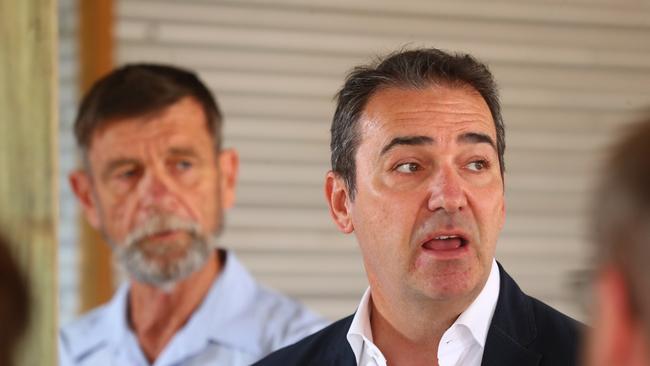The State – Daniel Wills: SA Premier’s plan to tackle carbon pollution shows political climate is finally starting to change
A Liberal leader saying that climate change is real and we should do something about it? State Political Editor Daniel Wills explains why the carbon wars just don’t play here in SA.
Opinion
Don't miss out on the headlines from Opinion. Followed categories will be added to My News.
- Marshall’s 2020 vision – we will tackle climate change
- Latest Advertiser subscriber exclusive rewards
Climate change has been the most destructive force in Australian politics for more than a decade.
It’s an issue that has cruelled the ambitions of five federal leaders – Kevin Rudd, Julia Gillard and Bill Shorten on the Labor side and Malcolm Turnbull (once in Opposition and again as prime minister) on the Liberal flank of the political aisle.
The central problem has been reconciling a perceived conflict between two deeply held popular convictions.
One is that climate change is real.
The Lowy Institute has been tracking public opinion on climate change since 2006. The number of full-blown climate-science deniers in Australia has always been low, and progressively tracking downward after peaking a decade ago.
Today, just 10 per cent of respondents agree with the statement: “Until we are sure that global warming is really a problem, we should not take any steps that have economic costs”.
Of the people who say something should be done, there is a growing sense of urgency. Sixty-one per cent of all polled say global warming is serious and should be addressed even if it brings large costs.
Twenty-eight per cent say something should be done, but there’s no need to rush.
The country wants action. But that has frequently come into conflict with the second strongly held conviction relating to climate change – a clear lack of real willingness to make any self-sacrifice.
A Reuters-Ipsos poll taken in the US last year found only 34 per cent said they would be willing to pay $100 a year more in taxes or power bills to slow global warming.
Like a climate-lecturing Hollywood celebrity who burns enough fuel in their private plane each year to choke the Amazon, most voters think it’s actually someone else who should do something about it.

Support for climate action has been broad but shallow.
Protection of a job or the hip pocket has been unwavering and electorally fierce.
Australia and the US are perhaps the two major countries most divided on climate policy. Former UK Conservative prime minister David Cameron is currently in the news championing his own climate legacy and urging right-of-centre leaders to take a lead in the global challenge.
“These are natural conservative issues,” he told the ABC’s 7.30.
“Don’t leave this to the left or you’ll get an anti-business, anti-enterprise, anti-technology response.”
Perhaps the biggest difference between this country and his, and therefore our politics, is fairly simple geography and demographics. Queensland, rich in fossil fuel resources and especially coal, has become increasingly important in Australian federal elections.
There are large numbers of people in marginal electorates who are making the best wages they will ever see in their life by digging stuff up and sending it overseas to be burned.
They wonder why they and their families should suffer disproportionately for the good of mankind, while arts graduates in swank suburbs of Melbourne do nothing but scowl.
Premier Steven Marshall’s comments in the annual Advertiser leaders interview will come as a surprise to many.
A Liberal saying that climate change is real and we better get on with doing something practical about it, while also having a long-term ambition not to emit a single gram of net carbon, seems as foreign as an Oscar winner calling for lower taxes and more personal freedom.
Opposition Leader Peter Malinauskas goes further, calling for national action on climate as a way to get power bills down.
The surprises keep coming. Climate has never been a red-hot political argument here. Certainly, the rush to renewables has flared but the battle was more on the journey than the final destination. A couple of factors play into that.
South Australia is a global leader in the amount of installed rooftop solar. Individuals have had a lived experience of lower bills linked to renewables. What works on the small scale often hasn’t been repeated at industrial size, but there’s a warm and fuzzy first impression nonetheless.
The other is the lack of anything to rival the job-sustaining fossil industries of the kind found in Queensland or battleground US states.
Great SA companies such as Santos do produce significant amounts of gas, but the workforces and reliant communities just don’t compare. Leigh Creek shrunk when SA’s last coal-fired power station shut at Port Augusta.
The electoral dynamics that have held the country hostage simply don’t apply here. Technology is maturing to a point that means reliability problems with wind power can be moderated, and commercial prices for equipment are coming down.
SA alone won’t stop oceans rising, but it can be a modest political model on how to get there.
